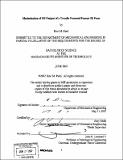Maximum of oil output of a treadle-powered peanut oil press
Author(s)
Patel, Ravi M. (Ravi Mahendra)
DownloadFull printable version (3.000Mb)
Other Contributors
Massachusetts Institute of Technology. Dept. of Mechanical Engineering.
Advisor
Amy Smith.
Terms of use
Metadata
Show full item recordAbstract
The manual processing of food products has become a substantial part of the daily routine of a typical household in the developing world. Consumption of oil is an essential part of an individual's diet and thus, the production of oil is an essential activity. In many communities, this oil is obtained by manually pressing it from peanuts. In order to more efficiently and easily express oil from peanuts, a design for a treadle-powered peanut oil press was created. My thesis work will attempt to further increase the amount of oil extracted by optimizing the design of this peanut oil press. The press transfers the motion of the treadle to the horizontal motion of a piston that presses the peanuts via a rotating cam. The focus of this thesis will be optimizing the design of the cam with respect to oil yield. The shape of the cam determines the displacement profile of the piston's compression of the peanuts. I will determine the optimal profile by designing and performing experiments on a variety of different displacement profiles and measuring the amount of oil extracted from the pressed peanuts. The results of these experiments will then determine the optimal cam design.
Description
Thesis (S.B.)--Massachusetts Institute of Technology, Dept. of Mechanical Engineering, 2007. Includes bibliographical references (leaves 32-33).
Date issued
2007Department
Massachusetts Institute of Technology. Department of Mechanical EngineeringPublisher
Massachusetts Institute of Technology
Keywords
Mechanical Engineering.